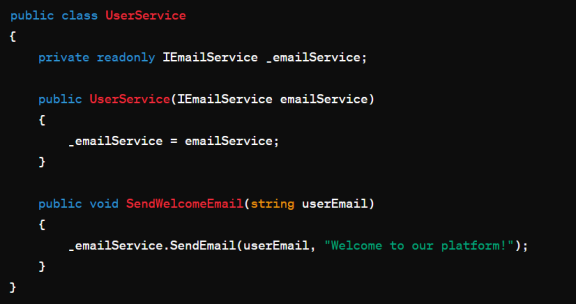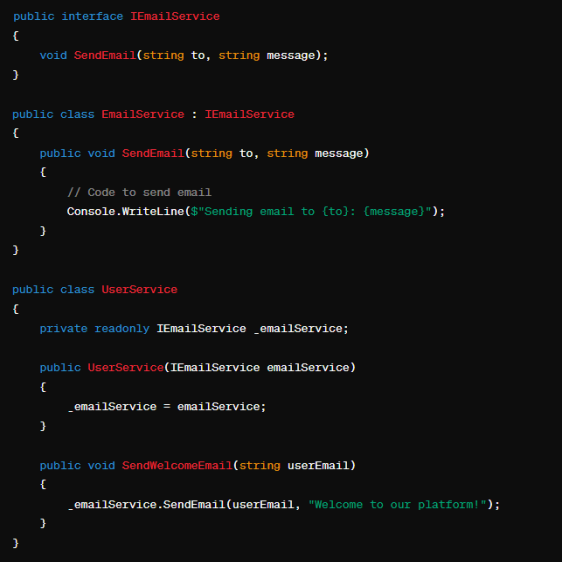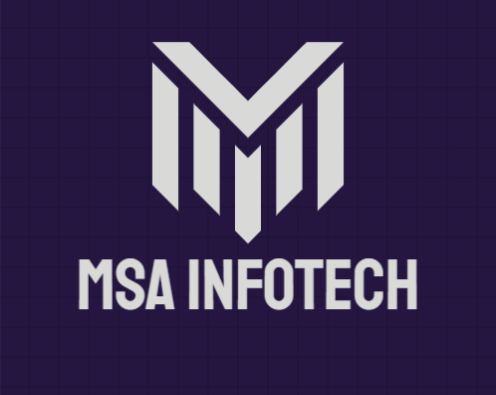Dependency Injection in C#
- Data Engineering
- November 05, 2024
-
Dependency Injection in C#
Introduction:
Dependency Injection (DI) is a design pattern widely used in modern software development, especially in object-oriented programming languages like C#. It helps in achieving loosely coupled and maintainable code by decoupling dependencies between classes. In this Blog post, we will explore Dependency Injection in C#, covering its principles, methods, advantages, disadvantages, best practices, and providing detailed examples to illustrate its usage.
Understanding Dependency Injection in C#:
Dependency Injection is a design pattern where the dependencies of a class are provided from outside rather than created within the class itself. In C#, this pattern is commonly implemented through constructor injection, property injection, or method injection. Dependency Injection promotes reusability, testability, and maintainability by allowing dependencies to be easily replaced or mocked.
Methods of Dependency Injection:
1). Constructor Injection:
Constructor Injection is the most common method of Dependency Injection in C#. Dependencies are passed to a class through its constructor. This allows the class to be initialized with its required dependencies during instantiation. Example:

2). Property Injection:
Property Injection involves setting the dependencies through public properties of the class. This method is less preferred than constructor injection because it makes the class less self-explanatory and can lead to runtime errors if the properties are not properly initialized. Example:

3). Method Injection:
Method Injection involves passing dependencies as method parameters when calling the method. This method is useful when a dependency is only required for a specific method call and not for the entire lifetime of the object. Example:

Advantages of Dependency Injection in C#:
1) Loose Coupling: Dependency Injection promotes loose coupling between classes, making it easier to maintain and extend the Codebase.
2) Testability: By injecting dependencies, it becomes easier to unit test classes in isolation by replacing real dependencies with mock objects.
3) Flexibility: Dependency Injection allows dependencies to be easily replaced with different implementations, providing flexibility and enabling the use of alternative components.
4) Reusability: By separating concerns and dependencies, components become more reusable across different parts of the application.
Disadvantages of Dependency Injection in C#:
1) Increased Complexity: Implementing Dependency Injection can add complexity to the Codebase, especially in large applications with many dependencies.
2) Performance Overhead: Dependency Injection frameworks may introduce a performance overhead due to additional object creation and management.
3) Learning Curve: Learning how to use Dependency Injection properly and effectively can require time and effort, especially for developers new to the concept.
Best Practices for Dependency Injection in C#:
1) Use Constructor Injection: Prefer constructor injection over other methods like property or method injection, as it ensures that dependencies are initialized when the object is created.
2) Avoid Overuse of DI Containers: While DI containers can be useful for managing dependencies, avoid overuse and only use them when necessary. Over-reliance on DI containers can lead to overly complex and tightly coupled code.
3) Keep Dependencies Minimal: Aim to keep the number of dependencies for each class to a minimum to avoid excessive complexity and potential performance issues.
4) Design for Testability: Design classes with testability in mind by using Dependency Injection to inject dependencies rather than creating them internally.
Example of Dependency Injection in C#:
Consider a scenario where we have a 'UserService' class that depends on an 'IEmailService' interface for sending welcome emails to users.

In this example, the 'UserService' class depends on an 'IEmailService' interface for sending welcome emails. We inject the 'IEmailService' dependency into the 'UserService' class via constructor injection.

Dependency Injection is a powerful design pattern in C# that promotes loose coupling, testability, and maintainability in software applications. By understanding its principles, methods, advantages, and best practices, developers can write cleaner, more modular, and easier-to-maintain code.
ssssssStart Your Data Journey Today With MSAInfotech
Take the first step towards data-led growth by partnering with MSA Infotech. Whether you seek tailored solutions or expert consultation, we are here to help you harness the power of data for your business. Contact us today and let’s embark on this transformative data adventure together. Get a free consultation today!

We utilize data to transform ourselves, our clients, and the world.

Partnership with leading data platforms and certified talents



